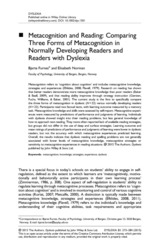Metacognition and reading: Comparing three forms of metacognition in normally developing readers and readers with dyslexia
Peer reviewed, Journal article
Published version

Åpne
Permanent lenke
https://hdl.handle.net/1956/11049Utgivelsesdato
2015-08Metadata
Vis full innførselSamlinger
- Department of Education [300]
Originalversjon
https://doi.org/10.1002/dys.1501Sammendrag
Metacognition refers to ‘cognition about cognition’ and includes metacognitive knowledge, strategies and experiences (Efklides, 2008; Flavell, 1979). Research on reading has shown that better readers demonstrate more metacognitive knowledge than poor readers (Baker & Beall, 2009), and that reading ability improves through strategy instruction (Gersten, Fuchs, Williams, & Baker, 2001). The current study is the first to specifically compare the three forms of metacognition in dyslexic (N = 22) versus normally developing readers (N = 22). Participants read two factual texts, with learning outcome measured by a memory task. Metacognitive knowledge and skills were assessed by self-report. Metacognitive experiences were measured by predictions of performance and judgments of learning. Individuals with dyslexia showed insight into their reading problems, but less general knowledge of how to approach text reading. They more often reported lack of available reading strategies, but groups did not differ in the use of deep and surface strategies. Learning outcome and mean ratings of predictions of performance and judgments of learning were lower in dyslexic readers, but not the accuracy with which metacognitive experiences predicted learning. Overall, the results indicate that dyslexic reading and spelling problems are not generally associated with lower levels of metacognitive knowledge, metacognitive strategies or sensitivity to metacognitive experiences in reading situations.
